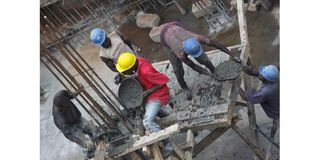Only 3pc of construction artisans are women

Men at work: A construction site in Kisumu. A study says the society perceives women who join the construction industry as desperate or cash-strapped, hindering women’s entry into the industry.
What you need to know:
- Prohibitive perceptions are an obstacle to raising the number of women in the construction industry according to preliminary findings from an ongoing three-year study.
- Those who join are faced with other myriad of challenges including little pay, sharing of washrooms and sexual harassment.
The Kenyan society still perceives women who join the construction industry as desperate or cash-strapped, yet they are often seeking better paid labour, a new study has found.
Preliminary findings from an ongoing three-year study jointly done by International Development Research Centre, Buildher and Dalberg found such perceptions to be a huge hindrance to women’s entry into the industry, which among the fastest-growing in Kenya. The findings were shared during a virtual forum on Wednesday.
In the third quarter of 2020, for instance, the sector recorded a 16.2 per cent growth, compared to 6.6 per cent in the same quarter in 2019, according to Kenya National Bureau of Statistics data.
Nevertheless, women only comprise three per cent of construction artisans in Kenya, indicates the Advancing Women’s Participation in Kenya’s Construction Industry report. And the prohibitive perceptions are an obstacle to raising the numbers.
Control group
The 117 women who participated in the study were divided into a treatment group of 47, constituting those who had enrolled for Buildher 12-month training in carpentry and joinery, painting, tiling and decorating courses. The other 70 in the control group were aged 18-35 and were acquiring construction skills through direct work experience.
Fifty three per cent of the apprentices and 36 per cent of the trainees found the societal norms of women working in the construction industry to be restrictive.
“Men and women assume that women who choose to enter the sector must be encountering short-term financial or personal problems,” reads of the report.
The women said they joined the industry because of the relative high pay compared to other forms of casual labour, such as hairdressing and sporadic domestic work.
“I didn’t do very well in school, so I settled on doing construction. The pay is small in laundry work, you can get one job in a week and get paid Sh300. [But] construction is just better money. You can get paid Sh500 a day, or Sh2,500 a week,” said one of the women interviewed in the study.
Sexual harassment
But even as they enter the industry, they are faced with other myriad of challenges including little pay, sharing of washrooms and sexual harassment.
The 74 per cent of the trainees said they earned less that Sh10,000 a month, an income they said was too little to save.
To address the inequalities, the report recommends the government to enforce equal pay regulations and requirements for all employers to provide gender-inclusive facilities.
It also suggests mentorship and sponsorship programs initiated by construction organisations. These would include actively identifying mentors and sponsors who can mentor new female employees.
For employers, the report suggests creating awareness “through posters that are printed and displayed on construction sites and workshops…that clearly illustrate what sexual harassment is, provides examples and information on the reporting mechanism of incidents.”






